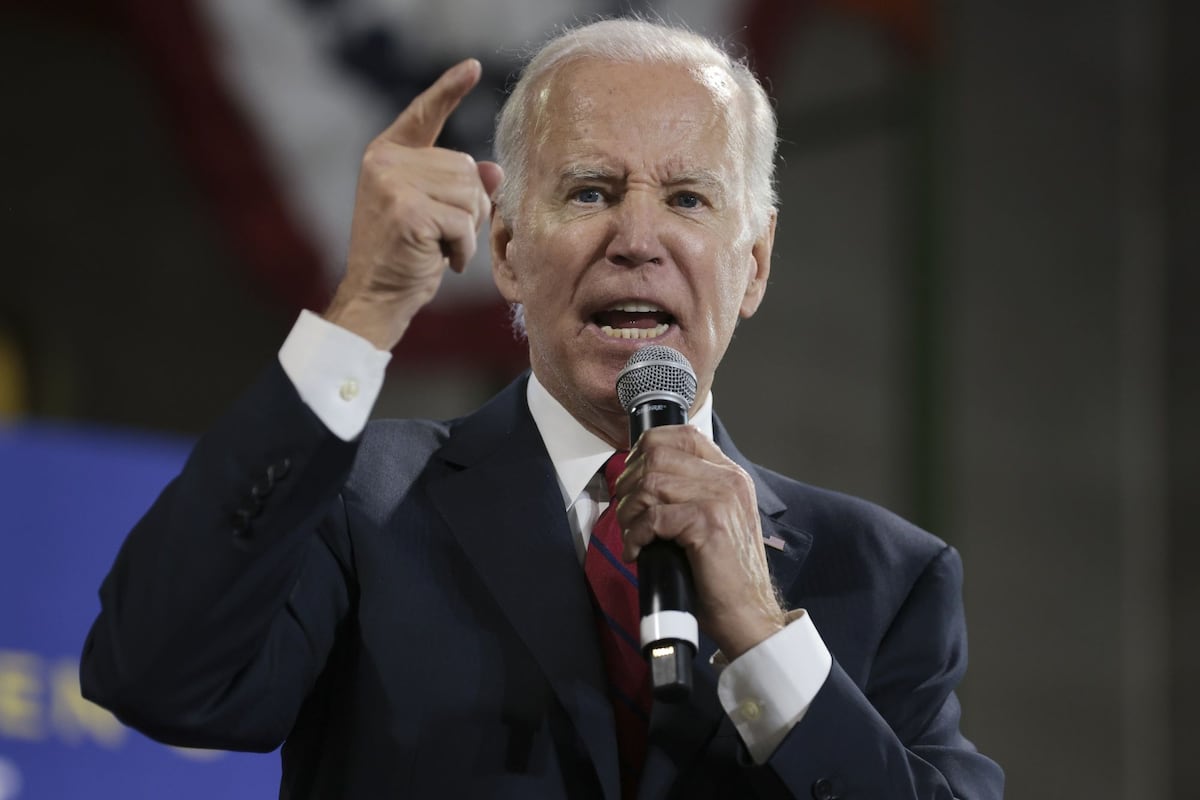“To hell with that.” Biden rejects European criticism of his economic protectionism | Economie

Yesterday, Joe Biden wanted to celebrate that the US economy continues to grow at a good pace (at a quarterly rate of 2.9% between October and December), and that inflation is losing steam and the unemployment rate is equal to the lowest level for the past half century. On the day the GDP data was published, the President of the United States scheduled an event with unions in Springfield, on the outskirts of Washington, in Virginia. There he made a presentation of economic protectionism and dismissed international complaints (among them European ones) of his protectionism: “To hell with that,” he said, later laughing.
It was an environment conducive to a nationalist message to unionized industrial workers. “Where is it written that the United States cannot return to being the world leader in manufacturing? Where is it written? I don’t know where it is written. That would not be off the mark,” said the president, before directly referring to protests from other countries over his industrial policy. getting ready.
Ladies and gentlemen, we are under international criticism for focusing too much on America. To hell with that. This is very dangerous. The supply chain will start here. And he said that those … those countries that are democracies, they’ll be able to benefit from what we’re doing, and we’ll make sure that they have … a supply chain that doesn’t end with us.
Biden launched aid and subsidies to boost microprocessor manufacturing and to advance the energy transition in the United States. The European Commission already complained last summer that some of these measures, notably those included in the Inflation Reduction Act, the main climate and its tax bill, were “clearly discriminatory”, particularly with electric cars manufactured in the European Union.
Suppliers
Washington also included strong incentives for chip manufacturing, though Biden admitted Thursday in a law with unions that this decision “caused a certain stir around the world.” The President of the United States hid behind the problems in the global supply chain caused by the pandemic and, in particular, the microprocessor shortage crisis. The increase in the cost of chips and the decrease in their supply has made all kinds of products more expensive, from cars to refrigerators, through cell phones and computers.
One of the outcomes that experts have indicated the pandemic will have is the reconfiguration of global supply chains to reduce dependence on third countries. Biden, who has seen inflation erode his popularity over the past year, has led the way in attracting and stimulating investment that changes trade flows.
This Thursday he made it clear again in Springfield: “We can never be in a situation where American automakers can’t make cars because we don’t make chips in the United States,” he said. We cannot allow this to happen again. So, what we’ve done: With the CHIPS Act and science, I’ve committed that the supply chain will start in America, not in America,” he said to applause from the audience.
Although the United States has always tried to theoretically distinguish its allies, Western democracies, and other economic rivals such as China, protectionism is also hurting European companies. Faced with the difficulty of making any progress, Brussels has begun to consider its own response.
The President of the European Commission herself, Ursula von der Leyen warned in December“The EU will respond in an appropriate and measured manner.” Von der Leyen highlighted that the law of inflation reduction is investing throughout the entire value chain in strategic sectors. “This is not always the case with our government aid. We must take a fresh look at how we can support the entire value chain, and move to mass production of strategic green technology solutions and clean finished products. Even through public investment.
Then he conveyed the same message to the heads of state and government In a speech aimed at streamlining state aid For renewable energies, industrial decarbonization processes or strategic products in transition (batteries): “We have to facilitate public investment to foster this unprecedented transition,” he said, adding: “The EU is a leader in clean technology, it wants to lead and companies continue to Invest here.
On the other hand, Biden wants them to invest in the United States. Not only is it ignoring international criticism, but it went a step further this Thursday by announcing the formation of a government called “Investing in America” and seeing how best to use that aid. “I’m going to take all the cabinet members, the secretaries of commerce, labor, transportation, treasury, energy, health and human services, and the EPA, and I’m going to put them in the cabinet,” he said. “And they will come up with a plan: How do we apply everything we’ve done (…) And in the process, I promise you what will happen: You will attract billions of more dollars in private investment and get the best possible outcomes for American workers and families.”
morning country
Wake up to today’s analysis by Marfa Berna Gonzalez

“Award-winning zombie scholar. Music practitioner. Food expert. Troublemaker.”









